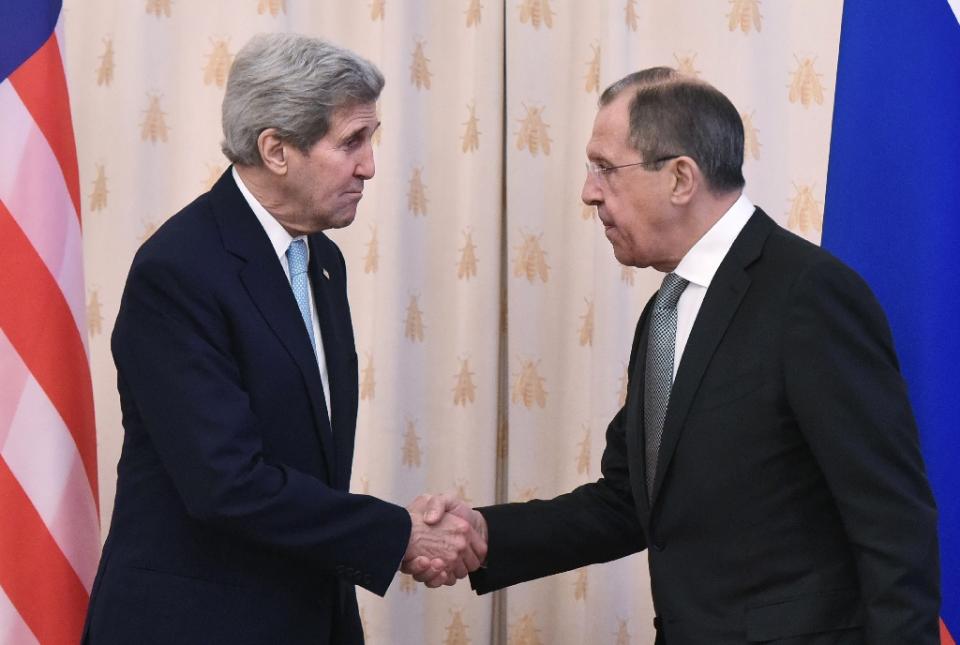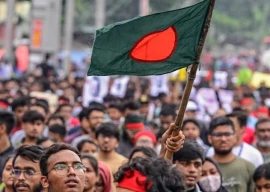
Bringing his campaign to end the bloody Syrian civil war to Moscow and keep the fragile peace process on track, Kerry first held talks with his usual sparring partner Foreign Minister Sergei Lavrov.
Kerry and the UN envoy for Syria, Staffan de Mistura, want to hold the next round of Syrian peace talks on Friday in New York, but Moscow has so far refused to confirm the date.
Obama, Putin agree need for UN-negotiated Syria talks, ceasefire
Speaking after meeting Lavrov, Kerry declined to say whether the New York negotiations would go ahead on Friday.
"Well, I need to meet with the president. I look forward to that," he told reporters on a stroll in central Moscow, where he was mobbed by Russians wanting to get a glimpse of Washington's top diplomat.
He said as he sat down with Lavrov earlier Tuesday: "The world benefits when powerful nations with a long history with each other have the ability... to find the common ground."
Kerry and Lavrov have a reputation as friends despite the ups and downs of the US-Russian relationship, but the pair were grave and business-like as their teams sat down in a Moscow mansion.
Obama says will not relent in fight against Islamic State, urges Russia help
"Later today we will tell President Putin what we have discussed and I hope that your visit will be fruitful," Lavrov said, after laying out an agenda that included Syria and the Ukraine crisis.
Washington is relying on the Kremlin to drag Russian ally Bashar al-Assad to the table for talks with his rebel opponents on ending Syria's vicious four-and-a-half-year civil war.
US ally Saudi Arabia is putting together the coalition that would negotiate on behalf of the rebels, with a view to first agreeing a ceasefire and then launching a political dialogue.
And looming over the effort to end the bloody conflict is the threat posed by the Islamic State group to spread the carnage beyond Syria's borders.
Obama met with Putin, plans to meet with Turkey's president at summit
Kerry said Russia and the United States were agreed on the need to fight the IS jihadists, despite differences on the peace process and Assad's eventual fate.
The hope is that if the regime and the rebels can agree a truce then they, Russia and a US-led coalition of Western and Arab allies can focus their fire on IS.
Washington and Moscow are the key powers in the process, leading talks through the 17-nation International Syria Support Group (ISSG).
Kerry called Lavrov the "co-convenor" of the talks and thanked him for his efforts "to lead us up now hopefully to getting to New York (on Friday) and building on the progress that's been made."
But the talks are in jeopardy after Moscow took issue with last week's unprecedented rebel talks in Saudi Arabia.
Also at issue is a separate effort by Jordan to draw up a list of Syrian groups the parties agree are "terrorists" and will be barred from the ISSG talks in New York.
Moscow said Monday that Friday's talks should not take place until all parties agree on both the rebel representation and the terror blacklist.
US officials have expressed frustration that Assad is trying to set his own rules about which opponents he is prepared to talk to and which are irredeemable terrorists in his eyes.
They insist Russia has committed to a political transition to end the war, and warn that if it cannot get Assad to the table, the Kremlin's own forces will get bogged down in the fighting.
But on the eve of the talks, Lavrov's foreign ministry issued a statement saying "Washington is seeking support for approaches... that don't always correspond with international law."
"We will continue to demand that the US administration revises its policy, which is based on the desire to divide terrorists into 'good' and 'bad' ones," it said.
Ties have also been strained over the crisis in Ukraine, but the US side said it would not be drawn into bargaining with Russia over the sanctions it imposed over Moscow's interference there.
Russia, which has dispatched air and naval forces to Syria to shore up Assad's regime, has agreed to help Washington pursue the peace plan.
But that came only after Kerry -- in talks last month in Vienna -- "agreed to disagree" with Moscow about Assad's fate. Moscow says it is for Syrian voters to tell him when to go.
The US believes Assad's brutal crackdown on opposition protesters in March 2011 triggered a civil war that has killed 250,000 and driven recruits to IS, which profited from the chaos.
America's regional allies, led by Saudi Arabia, are even more emphatic in declaring that Assad must go, demanding he step down as soon as peace talks begin.
The opposition leaders met last week in Riyadh and began the process of deciding their negotiating team -- but also repeated their demand that Assad step down immediately.





1730884134-0/BeFunky-collage-(26)1730884134-0-270x192.webp)




1732618327-2/Untitled-design-(7)1732618327-2-270x192.webp)






COMMENTS
Comments are moderated and generally will be posted if they are on-topic and not abusive.
For more information, please see our Comments FAQ